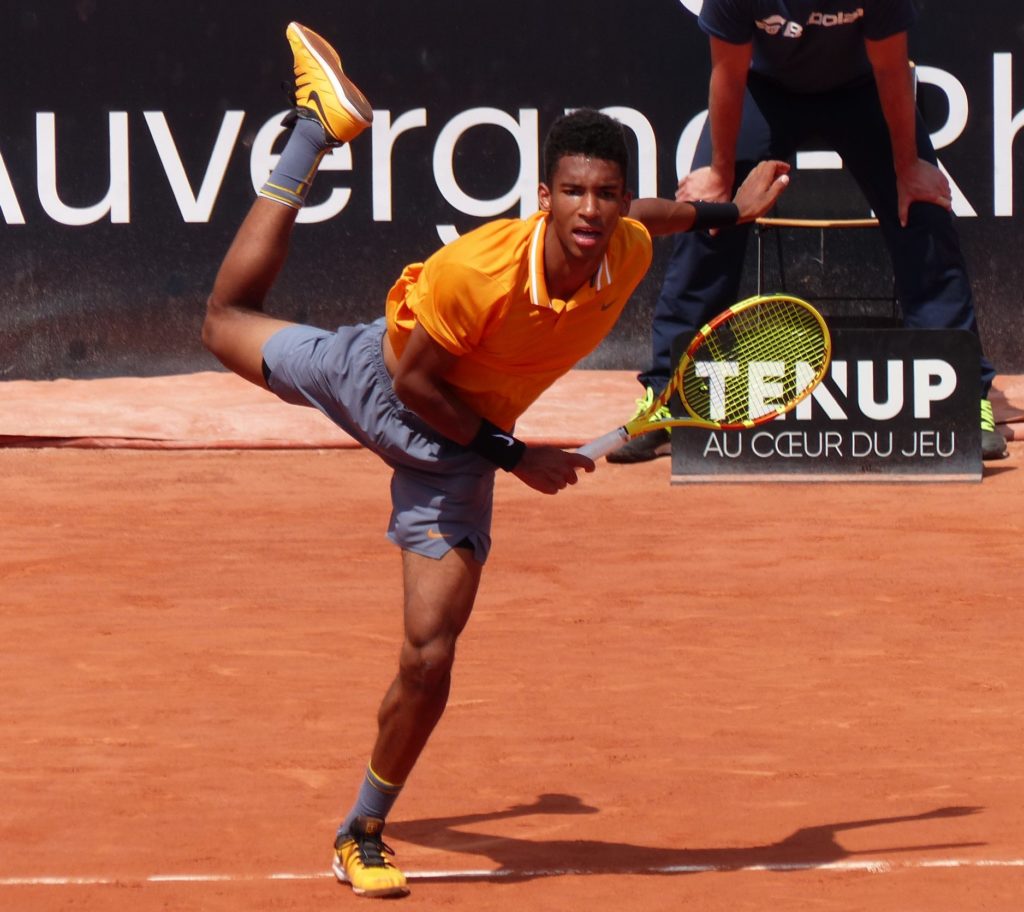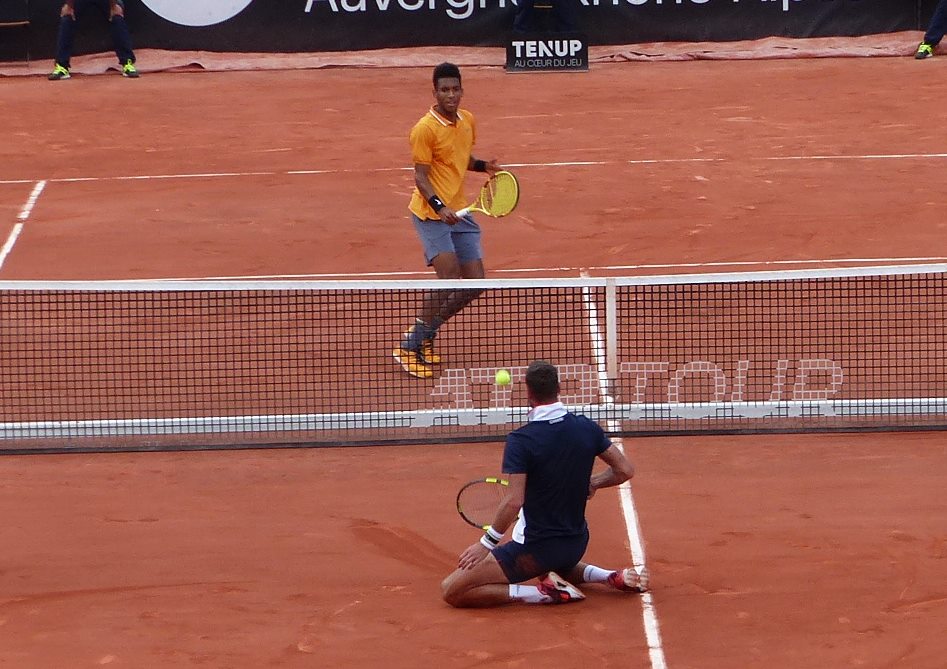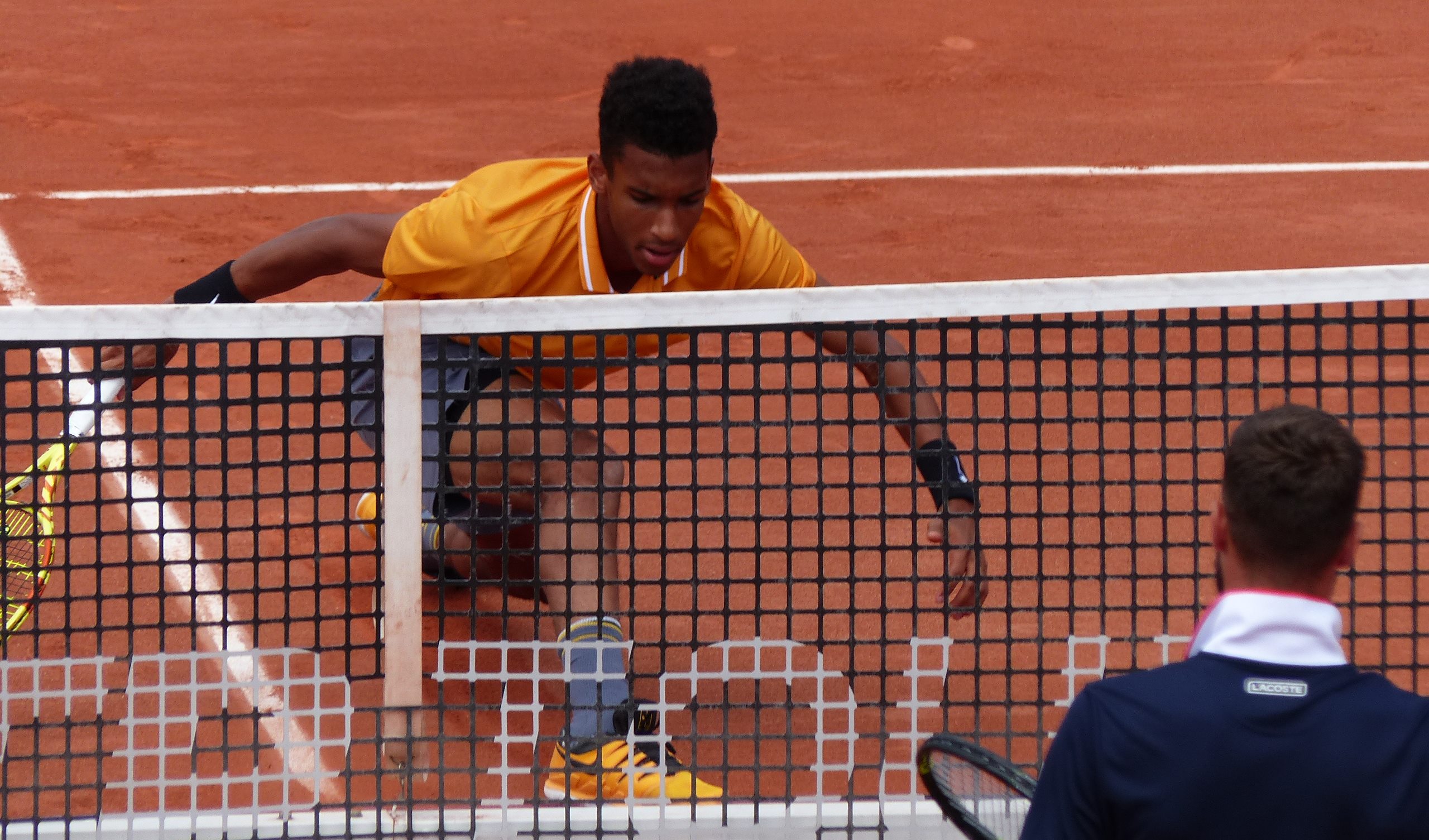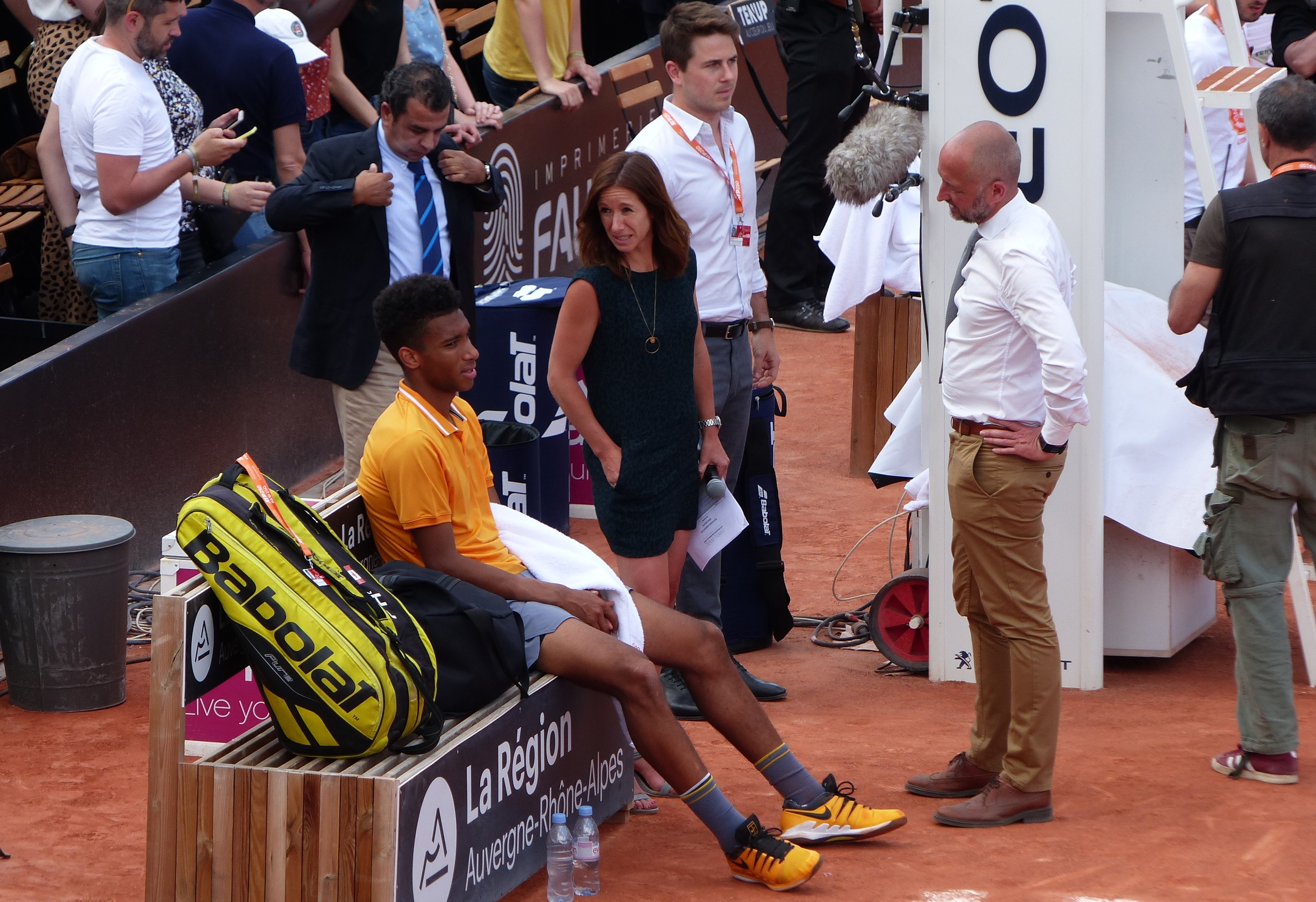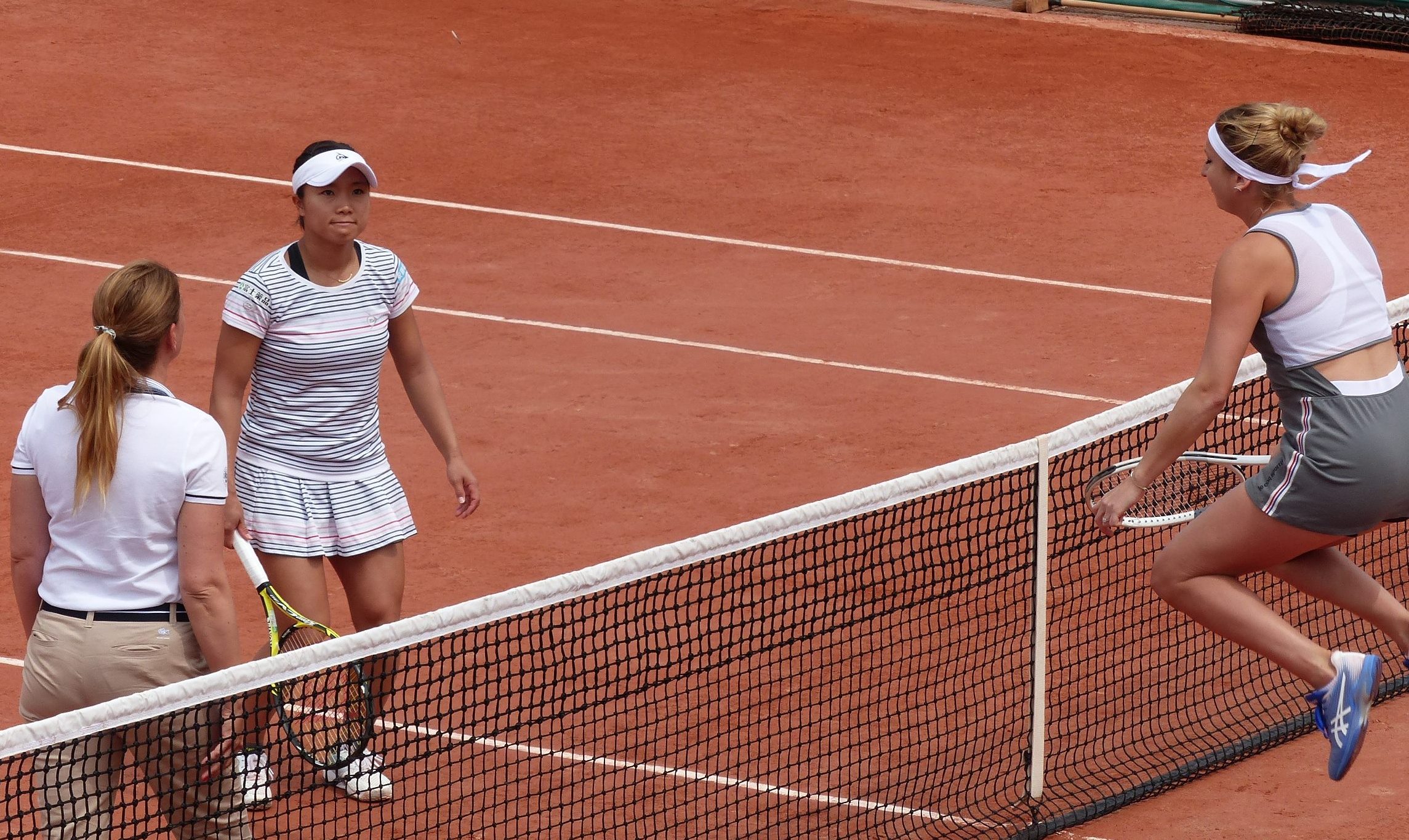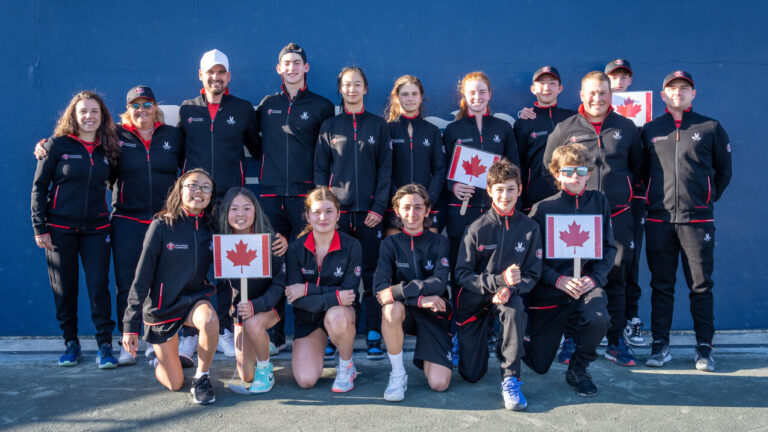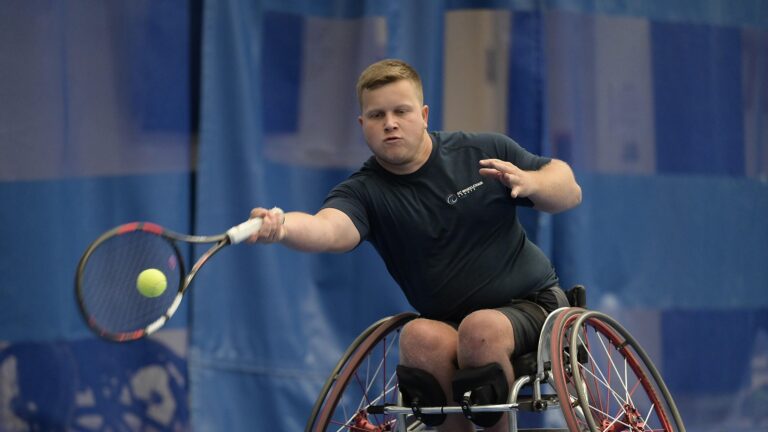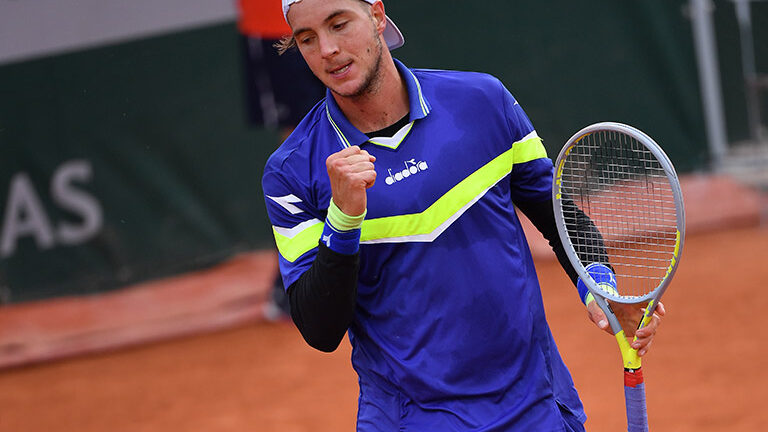
||||||
Felix Auger-Aliassime (post-final above) had won 13 matches in a row in Lyon, France – Challenger titles in 2017 and 2018 – and his first three rounds of this week’s Open Parc Auvergne-Rhone Alpes. But the streak ended Saturday when he was beaten 6-4, 6-3 by Benoit Paire in the championship match of the ATP 250 event.
The result became somewhat anticlimactic when it was learned that the groin injury Auger-Aliassime was treated for, trailing 3-2 in the final set of his 2-6, 7-6(3), 6-4 win over Nikoloz Basilashvili in Friday’s semi-final, had resurfaced during the match.
Auger-Aliassime said that he felt okay during a 45-minute practice session at 10:30 on Saturday morning but that it began to get worse during the match against Paire. “It was frustrating,” he summed up afterward. “Since yesterday I’ve tried to get ready as best as I could. It’s disappointing because it’s my second final (after Rio de Janeiro in February) and you don’t get to a final that often.”
One of the few things that brought a smile to his face was a reporter’s question about him finally losing in Lyon. “It had to happen,” he conceded. “I wasn’t going to win everything. It just proves that I’ve experienced great moments here. It was still a good week and I’ll keep very good memories of my week.”
Things then got more serious when talk turned to Roland-Garros (where he’s scheduled to play early next week). “I’ll see with my team but it’s difficult because we’re just a couple of days away,” he said. “I was barely able to finish the match today. It’s a complicated situation. It happened out of nowhere yesterday. We didn’t expect it. We’ll see tonight (Saturday) what we’re going to do going forward. It’s too soon to say – I’ve still got two days. I’ll make the decision in two days.”
Asked if he thought about withdrawing from the final, Auger-Aliassime said: “This morning I was pretty positive and I thought I’d be able to get through it. But the pain got worse and worse. After the end of the first set it was pretty difficult. I thought about possibly stopping but it’s a final – and you know what it’s like to win a title. You don’t want Benoit to win that way. So it’s complicated. I guess that sums up my day – a complicated day.”
He did give credit to Paire – a former world No. 18 (2016) who has moved up 13 spots to No. 38 with the title, his second in 2019 after Marrakech last month. “He played really well,” Auger-Aliassime said about the 30-year-old Frenchman. “Right until the end of the first set I wasn’t that bothered. Even in the second, I was able to serve and play a bit. We had a very long first point (of the match) and he made few mistakes. He served well, returned well and he played well whenever I came to the net. He played a very complete tournament.”
The 30-year-old Paire was aware of Auger-Aliassime’s limitations. “He was hurting and he didn’t talk about it but he was handicapped because he’s a really exceptional guy. As I said during the trophy presentation, he’s an exceptional player but off the court he’s super mec (great guy). I wish him the best for the rest of his career – and I’m not worried about him because he’ll win a tournament very soon.”
The match got away from Auger-Aliassime very quickly as he was broken in the third game on a double fault. Double faults have been an occasional problem for the 18-year-old Montrealer this year – but he was impeccable on Friday with zero double faults at crunch time in the second and third sets against Basilashvili. Not so in the final as he had four – and not at the most convenient of times.
Auger-Aliassime was vulnerable on Paire’s mightily-chopped drop shots (see above) and was visibly not too keen to run for some shots as the match went on.
In the second set, he managed to rally from 0-2 down but then proceeded to immediately lose his serve as Paire, emboldened against a wounded opponent, picked up the pace.
It is to be hoped Auger-Aliassime is able to play the French Open – his first in the main draw – and even better still his first as a seeded player (No. 25).
As much as there are huge disappointments with the outcome on Saturday, Auger-Aliassime has moved his ranking up to No. 22 and is two spots ahead of his friend Denis Shapovalov, now sitting at No. 24.
Still not 19 years old until August 8th – Auger-Aliassime has made incredible progress after starting 2019 ranked No. 108.
As much as the loss hurt – that’s a good sign in terms of motivation moving forward. Right after the match the tournament announcer – French ex-player Camille Pin – and tournament referee Pascal Maria attempted to console Auger-Aliassime. It didn’t work.
He has recovered well from setbacks in the past, coming back even stronger. His legion of fans will hope he’s able to do it again after a frustrating Saturday in Lyon.
BOUCHARD BACK IN SWING
Genie Bouchard is back in action for the first time since losing to Nao Hibino of Japan in the Miami Open qualifying in March. The 24-year-old Japanese was her nemesis in 2018 – beating her three times in two months in Vancouver, Hiroshima and Tashkent.
“I took a lot of time off for my ab (abdominal) to try and heal it once and for all,” Bouchard explained about her break from tennis during a media op at Roland-Garros on Friday. “And I didn’t want to spend too long in Europe – last year I spent three months and it was really long. Finally I decided I’d play the French.”
Elaborating about the abdominal issue, Bouchard said: “It’s like my Achilles heel – every player has one of those. It’s definitely recurring. I think it’s better – I’ve been ramping up my practice here and it’s definitely gotten a little sore as a result of the difference from just training.”
Asked about what she has tried to finally solve the problem, Bouchard said: “Rehab… Gym… Starting slowly with serves and progressively building up. And I think every time I do hurt it, it’s more vulnerable for the next time. I just try to be really aware when it gets sore to not push it and be smart.”
In the first round of Roland-Garros, the No. 77-ranked Bouchard has drawn No. 27 seed Lesia Tsurenko of Ukraine. They have split two previous meetings, with Bouchard winning their last encounter – a withering 4-6, 6-2. 7-6(5) victory in Canada’s 3-2 World Group II Playoff win in April, 2018, in Montreal.
“She’s a super-tough player,” Bouchard said about the 29-year-old Tsurenko. “I hope we don’t have a marathon like last year. That’s was brutal – we were both crawling between points basically. I guess both times (Indian Wells in 2015) we’ve had very physical matches so I need to get ready.”
JUMPING THE COIN TOSS
Timea Bacsinszky was a semi-finalist at the French Open two years ago – losing 7-6(4), 3-6, 6-3 to eventual champion Jelena Ostapenko of Latvia. Now ranked No. 94, the 29-year-old Swiss elevated (above) during the coin toss of her second-round qualifying match on Thursday against No. 236-ranked Kurumi Nara. But the diminutive 5-foot-1 Japanese came out on top in the end, winning 6-2, 4-6, 6-4 on her way to successfully qualifying.
